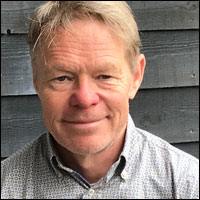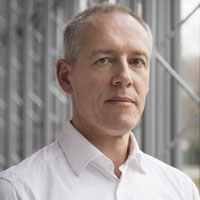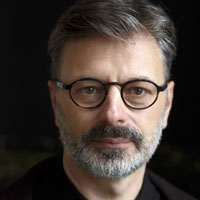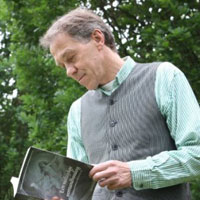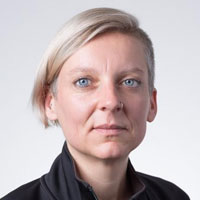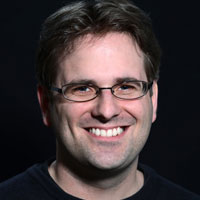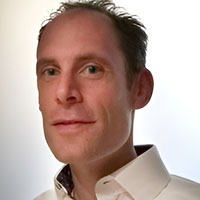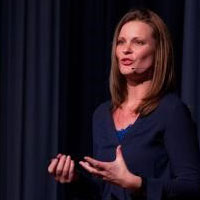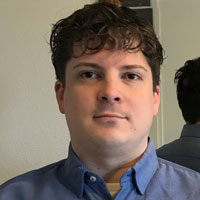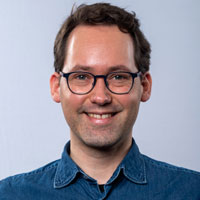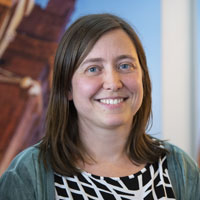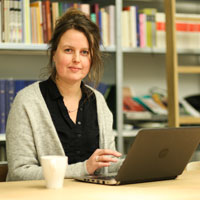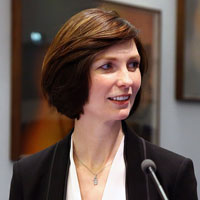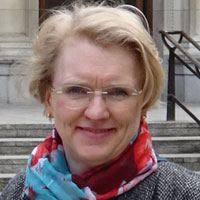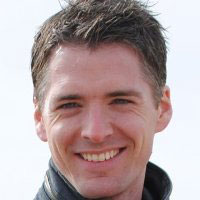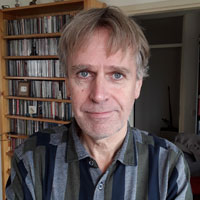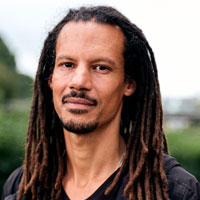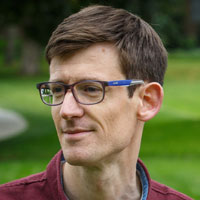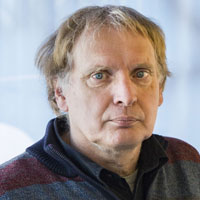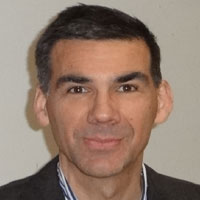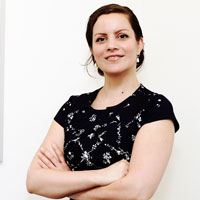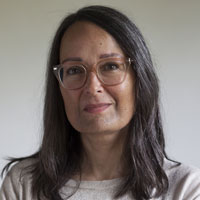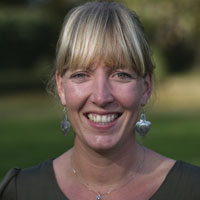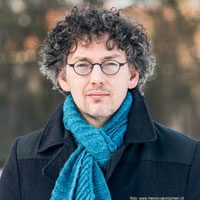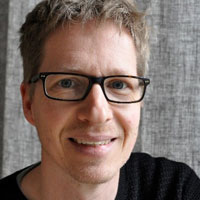Our researchers
Dean
|
|
Prof. dr. Jan Don |
Full professors
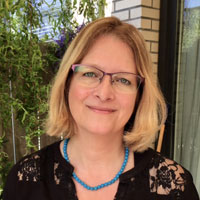 |
Prof. dr. Gemma Blok Research areas |
|
|
Prof. dr. Eddo Evink Research interest My research focuses on a number of ways of thinking: phenomenology, hermeneutics, deconstruction. I compare and apply these ways of thinking in all kinds of fields and in relation to all kinds of issues: technology, religion, security, violence, art. With this, my research moves into various fields: metaphysics, history of philosophy, philosophy of art, philosophy of the humanities, philosophy of technology. Currently, my research focuses on four themes: philosophy of the humanities, the thought of Czech phenomenologist Jan Patočka, hermeneutic metaphysics and philosophy of technology. Research areas Metaphysics, History of Philosophy, Philosophy of Art, Philosophy of the Humanities, Philosophy of Technology. |
|
|
Prof. dr. Gregor Langfeld Research interest Gregor Langfeld specializes in modern and contemporary art. He conducts research on German art and the interaction between art, politics and society during specific periods such as the years of National Socialism. Special areas of interest are migration, looted art and origin research. His scholarly interests further include reception research, the history of art collecting and canonization processes in the art field, how preferences for certain art forms change. In line with this, he has initiated an international research project on the institutionalization of modern art: (Un)Mapping Infrastructures: Transnational Perspectives on Modern Art, 1900-1990. Major books: Gregor Langfeld, German Art in the Netherlands: Collecting, Exhibiting, Criticism, 1919-1964 (Gemeentemuseum The Hague/Waanders 2004); Langfeld, Deutsche Kunst in New York. Vermittler - Kunstsammler - Ausstellungsmacher, 1904-1957 (Reimer Verlag 2011; English: German Art in New York: The Canonization of Modern Art, 1904-1957, 2015) and Langfeld (ed.), Het Stedelijk in de oorlog (Stedelijk Museum/Bas Lubberhuizen 2015, also in English). Research areas Modern art, The artistic canon and canonization processes, History of reception and the institutionalization of art, History of collecting and exhibitions, Provenance research. |
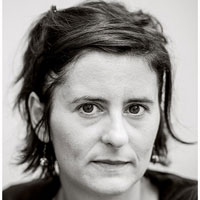 |
Prof. dr. Sarah de Mul Research interest Sarah de Mul holds the Chair in Literature, Culture and Diversity at the Open University, which has a distinctly interdisciplinary profile. The research focuses on the role of literature in relation to intercultural, (trans)national and global processes in modern society from the colonial period to the present. It approaches literature as a carrier of cultural memory and identity and examines the role of ethnicity, gender, nationality, class and sexuality in this. Central are new literary developments arising from a global history characterized by cross-cultural interaction, mobility and exchange across national, linguistic and geographical boundaries. Methodologically, insights from literary studies and postcolonial, gender and globalization studies are used. In this way, an illuminating contribution can be made from literature to current, social issues such as migration, feminism, national identity and cultural memory, and most recently, burnout culture. Research areas Comparative Literature, Gender studies, Postcolonial studies, Narrative Medicine. |
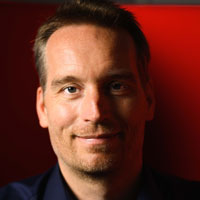 |
Prof. dr. Alexander Peine Research interest I am a Full Professor of Culture, Innovation and Communication at the Open Universiteit. My research links two pertinent societal developments (i) population ageing, including the challenges it allegedly poses for care and health systems, and (ii) technological change, including the push towards more interactive and 'smarter' technologies. In simple terms, one could say I study what population ageing means for the way we organise and direct technology and innovation, and, vice versa, how technology and innovation have come to shape how we age and how we imagine the future of health and care. This very intersection of ageing, health and care, on the one hand, and technological innovation, on the other, is a top priority for policy makers, industry and 3rd sector organisations worldwide. Research areas Science and Technology Studies, Age Studies, ageing and technology, digitization and society, Socio-gerontechnology. |
|
|
Prof. dr. Leo Wessels Research interest Interdisciplinary research at the interface of history and cultural studies, focusing on (modern) Dutch history in a European context. Research areas Enlightenment and Romanticism, Media history, Generations and the interaction between generations, History of politics and ideas (1650-1850), Nation-building, identity and historiography. |
University lecturers
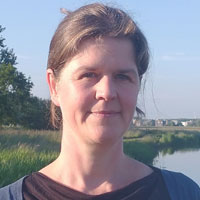 |
Dr. Nele Beyens Research interest My research is mainly in the field of medical history from the late nineteenth century onwards and often starts from a biographical perspective. Therefore I previously wrote the biography of the physician Hector Treub, who put gynecology on the map as a new specialty in the Netherlands in the late nineteenth century. Moreover one on Els Borst-Eilers, former Minister of Health, Welfare and Sport. These biographies included various medical-historical themes such as the development of gynecology, the struggle for the spread of contraceptives, the historical practice of abortion, the shaping of the Dutch anti-tobacco policy, the use of evidence-based medicine as a policy instrument to control the ever-rising costs in health care, or the creation of the Dutch Euthanasia Act. I am currently working on a cultural-historical study of the public debate on cancer and fight against cancer. Issues to be addressed include, for example, the question of who exactly gets (or claims) a voice in that debate; the gendered characteristics of the public debate on cancer and fight against cancer; the organization and goals of information; the role of the increasingly professionalizing patient movement and the rise of the disease narrative; the use of metaphors in speaking about cancer and cancer control, as well as the use of cancer as a metaphor for all kinds of social problems; etc. Research areas Medical history; historical biography; autobiographical disease experience narratives; political history. |
|
|
Dr. Marieke Borren Research interest My research expertise lies at the intersection of continental political philosophy and phenomenology. Core concept is "worldliness," the interpenetration and interaction of self with the world. In this I have a special interest in feminist and postcolonial perspectives. I specialize in Hannah Arendt's political phenomenology. I have published widely on displacement and (not) having a place in the world, focusing on the situation of refugees and illegal immigrants. The focuses of my current research are: Critical phenomenology of race: the lived and embodied experience of whiteness Phenomenological perspectives on democratic citizenship and public spaces. Within this, I focus on a variety of themes: (a) Ontological issues: spatiality, publicness, placement and motility, b) lived experiences of unequal power relations and processes of inclusion and exclusion, for example displacement and homelessness. c) An ethos of democratic discomfort. (d) The actorness of public things. 'The human' of human rights, crimes against humanity and genocides: 'a place in the world' and 'sharing the world'. Research areas Race, Whiteness, Physicality (especially racial and sexual differentiation), Public spaces, Democratic citizenship. |
|
|
Dr. Pieter de Bruijn Research interest Pieter de Bruijn's research takes place at the intersection of cultural heritage, historical representation and history education. In particular, his interest is in the cultural memory of the slavery past, the Second World War and the Holocaust in the Netherlands and the United Kingdom, and how these histories are represented in heritage, popular culture and education. De Bruijn's research mainly focuses on the (narrative) analysis of different forms of historical representation, and the meaning that strategies and techniques used have for history and citizenship education. He also works on translating insights from heritage education research into practice. He is also interested in conflicts surrounding and developments in the preservation and selection of cultural heritage in the nineteenth and twentieth centuries. Research areas Cultural heritage, Historical representation, Heritage education, History didactics, Cultural memory of slavery, Second World War and Holocaust. |
|
|
Dr. Martijn van der Burg Research interest My research focuses on the history of state and nation building from comparative and transnational perspectives. In particular, historical network research has my special interest. Specifically, the focus is on the development of modern state institutions, combined with a prosopographical analysis of key figures. To what extent cross-border movements contributed to developments within a nation-state? Issues surrounding European integration, not least under Napoleon, provide relevant cases for further research. More global developments also lend themselves to such an approach. Research areas History of administration, Napoleonic studies, Network research, Political history, History of law. |
|
|
Dr. Caroline Drieënhuizen Research interest My interest is in material culture and collecting of all kinds of objects in colonial contexts. This includes museology (the history of collecting and presenting objects in museums), as well as cultural heritage in the field of colonial history. Furthermore, I look at the (post)colonial history of mainly the Netherlands and Indonesia and the (cultural) decolonization of both colony and former colonizer. I am particularly interested in the role of networks, the nation-state, gender and race. Research areas (Post)colonialism, collection histories, museology, Indonesia. |
|
|
Dr. Tom Giesbers Research interest Within the history of philosophy I am mainly concerned with 19th century German philosophy (plus the 18th century from Kant) and 20th century French philosophy. Within these, I am also concerned with philosophical conceptual history topics such as realism, idealism, nihilism, relativism and drift. My expertise on the authors: Immanuel Kant, Johann Gottlieb Fichte, Friedrich Wilhelm Joseph Schelling, Georg Wilhelm Friedrich Hegel, Friedrich Heinrich Jacobi, Johann Gottfried Herder, Karl Leonhard Reinhold, Solomon Maimon, Wilhelm Traugott Krug, Johann Georg Hamann, Friedrich Schlegel, Christoph Gottfried Bardili, Friedrich Köppen, Daniel Jenisch, Friedrich Bouterwek, Joseph Rückert, Christian Weiss, Jakob Hermann Obereit, Sigmund Freud, Theodor Adorno, Jacques Lacan, Pierre Klossowski, Michel Foucault, Jacques Derrida. Research areas Epistemology, ethics, aesthetics, psychoanalysis, German idealism. |
|
|
Tim van der Heijden Research interest My research focuses on the intersection of media history, digital technology and cultural heritage. From a young age, I have been captivated by how both historical and contemporary media technologies shape our everyday communication and perception of reality. In my dissertation, I focused on the history of amateur film. From a long-term historical perspective, I examined how changing media technologies such as film, video and digital media have affected the recording of family memories throughout the twentieth century. After my PhD, I worked as a postdoctoral researcher at the University of Luxembourg. There I coordinated an international project on digital history and hermeneutics and worked as a researcher developing "experimental media archaeology" as a hands-on approach to media history. My current research focuses on amateur media history, experimental media archaeology and digital film history. Research areas Media history, media theory, media culture, history of amateur media, experimental media archaeology, digital history, digital heritage, audiovisual heritage, cultural memory, technostalgia. |
|
|
Dr. Marjolein van Herten Research interest Marjolein van Herten (b. 1981) studied Dutch language and literature at Radboud University. In 2015 she received her PhD from the Open University on a study of contemporary reading clubs. Her current research concerns reading clubs in education and future and climate fiction. She works as an associate professor of literary studies and professional Dutch didactics. She is a member of the 'Meesterschapsteam Nederlands'. Research areas Climate fiction, Speculative fiction, Literature education. |
|
|
Dr. Susan Hogervorst |
|
|
Dr. Eline Huiberts Research interest As a researcher, Eline is primarily interested in the reception side of media (media users, i.e. everyone). Specifically, she investigates the way the public deals with bad news from distant countries (mediated distant suffering). She examines moral considerations and emotional reactions. In addition, she investigates how different forms of journalism can lead to different reactions. For example, she is currently investigating how constructive journalism works in relation to seeing bad news from distant countries. With her interdisciplinary approach and use of multiple methods, she likes to build bridges between different scholars and disciplines. Moreover, she is always looking for a way to bring research back to practice. She tends to say that she is not a researcher of media, but of people. Keywords: media studies, audience studies, constructive journalism, social psychology, distant suffering. |
|
|
Dr. Femke Kok Research interest I specialize in the history of philosophy. My current research concerns the (history of the) philosophy of psychiatry/psychology and the philosophy of aging (ageing). I am particularly interested in the philosophy and phenomenology of mental 'disorders' such as depression, autism and dementia, and the role that the body/embodiedness plays in them. I am also interested in philosophical discussions of the nature and experience of emotions and the value (both moral and ontological) of classification systems such as the DSM. Research areas History of philosophy, Philosophy & psychiatry, Philosophy of Ageing. |
|
|
Dr. Frauke Laarmann-Westdijk Research interest My interest was initially focused on seventeenth century painting in the Northern Netherlands, in particular portraits with their pictorial tradition and function. This interest has become increasingly broader in recent years, partly due to my task as supervisor of several courses in ancient art at the Open University. Especially material-technical aspects of very diverse art genres and the market that existed for these products have my interest. Research areas Seventeenth-century painting, art production from the 14th to 16th centuries in a variety of media, material-technical aspects of art, portraiture, religious iconography. |
|
|
Dr. Ted Laros Research interest I am particularly interested in the development of discourses around freedom of expression and artistic freedom, and the legal and judicial interpretation of these (fundamental) rights in the Western world and beyond since about 1800. My doctoral project focused on the development of artistic freedom, particularly in relation to literature, in South Africa since the founding of the Union of South Africa in 1910. My current projects focus on (a) the (disciplinary) purge of the literary field in the Netherlands after WWII and the deontological and legal discourses around writer's responsibility that were promulgated during this purge; and (b) the judicial treatment of humor in the Western world and beyond in different historical periods. Research areas Humanities and law/culture and law, (Historical) cultural sociology, Literary historiography. |
|
|
Dr. Jan Oosterholt Research interest My research currently focuses on the place of foreign literature in the Netherlands and, more generally, on cultural transfers. Special attention is paid to 19th-century stage adaptations of novels from the French, English and German languages and to 'rewritings' of canonized literature. Research areas Dutch literature from the 18th century to the present, Reception of foreign literature in the Netherlands and Flanders, Theory and practice of literary historiography, Imagology, Adaptations of literary texts. |
|
|
Dr. Sibo Kanobana Research interest My research is at the intersection of sociolinguistics, anthropology, postcolonial studies, and cultural studies. I focus on the analysis of both interactions, discourse, and cultural productions - such as literature, music, film, etc. - and explore how through language and culture ideological frameworks are enacted or just challenged. In doing so, I am specifically interested in tensions and contradictions expressed in social processes rooted in our colonial past. In this way, I try to contribute to a better understanding of social issues related to political economy, diversity, identity, migration, communication and discrimination. Research areas Sociolinguistics, anthropology, postcolonial studies, cultural studies. |
|
|
Dr. Wouter Schrover Research interest My research focuses on the relationships between language, culture and education, particularly in the digital domain. On the one hand, my focus is on information and data literacy: the ways in which people search for, find and - above all - assess sources online. For the latter, the focus is not only on assessing the credibility and reliability of these sources, but also - more broadly - on the ways in which notions such as genre/text type, discourse mode (such as telling and arguing) and (non-)fictionality are employed in the assessment of various types of information. On the other hand, it deals with the study of interaction, communication and collaboration through digital technologies. Applications in education, such as collaborative annotation tools, are central to this. Research areas Digital Literacy; Social Annotation; Literature & Science Studies. |
|
|
Dr. Herman Simissen Research interest Philosophy of science of the cultural sciences, in particular history, viewed in its historical and intellectual context. Research areas The (philosophy of history) of Theodor Lessing (1872-1933); the (philosophy of history) of R.G. Collingwood (1889-1943); general issues of philosophy of science in relation to historiography. |
|
|
Dr. Jeroen Vanheste Research interest My research covers the field of mental health humanities and focuses on how philosophy and literature can contribute to thinking about mental health problems. Psychiatric disorders have not only a biological (genetic, neurological) side but also a subjective and cultural dimension. Contextual conditions such as personal life history and the social, economic and cultural environment, can play a crucial role in the development and course of psychiatric problems. Philosophical human images can help get a handle on the multifaceted nature of these problems, while novels, films and other cultural representations of psychiatric illnesses can contribute to their understanding. In my own research within the mental health humanities, I focus primarily on philosophical thinking about depression and its representation in literature and film. One of my areas of interest here is that of public stigma on depression: the ways in which representations of depression in literature and film can facilitate or counteract stigma. Research areas Mental health humanities; depression; stigma; cultural philosophy; philosophical anthropology. |
|
|
Dr. Marieke Winkler Research interest My current research focuses on the interaction between literature and science. How does literature process (or inspire) scientific insights and - conversely - how do researchers make use of literary resources? Why is so much expected of literature in imagining new worlds? I am currently researching this in particular for the genre of future and climate fiction. In addition, I am always interested in recent developments within literary studies and literary criticism and how they relate to the historical development of literary studies in the Netherlands and abroad. The central focus of this line of research is on the circulation of knowledge between academic and public communities or discourses. Research areas Poetry and narrative analysis, narratology, circulation of knowledge, History of the Humanities (history of literary studies in particular), ecocriticism, utopian studies, discourse analysis. |
|
|
Dr. Nathalie Zonnenberg Research interest My research focuses on modern and contemporary visual art in its institutional and socio-political context, with the following themes being of particular interest to me:
Exhibition history, museums and collections, contemporary art in global perspective, biennials and art market. |
Post-doctoral researchers
|
|
Dr. Karin van Leersum Research areas |
|
|
|
Dr. Wim de Jong |
|
|
Dr. Maurice Paulissen |

